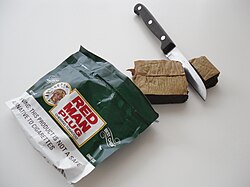
Marlboro is an American brand of cigarettes, currently owned and manufactured by Philip Morris USA within the United States and by Philip Morris International outside the US. Marlboro's largest cigarette manufacturing plant is located in Richmond, Virginia.
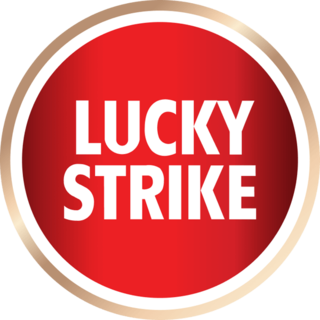
Lucky Strike is an American brand of cigarettes owned by the British American Tobacco group. Individual cigarettes of the brand are often referred to colloquially as "Luckies."

Swedish Match AB is a Swedish multinational tobacco company headquartered in Stockholm. The company manufactures snus, nicotine pouches, moist snuff, tobacco- and nicotine-free pouch products, chewing tobacco, chew bags, tobacco bits, cigars, matches, and lighters, with operations in Sweden, Denmark, the United States, the Dominican Republic, Brazil, the Netherlands, and the Philippines. The company's origins can be traced back to 1868, and Ivar Kreuger. Swedish Match has played an important part in Sweden's industrial development.

Pall Mall is a British brand of cigarettes produced by British American Tobacco.

Chewing tobacco is a type of smokeless tobacco product that is placed between the cheek and lower gum to draw out its flavor. It consists of coarsely chopped aged tobacco that is flavored and often sweetened; it is not ground fine like dipping tobacco. Unwanted juices are then spat.

John Player & Sons, most often known simply as Player's, was a tobacco and cigarette manufacturer based in Nottingham, England. In 1901, the company merged with other companies to form The Imperial Tobacco Company to face competition from US manufacturers. The company also released several series of association football trading cards in the 1930s under the Player's brand.

Silk Cut is a British brand of cigarettes, currently owned and manufactured by Gallaher Group, a division of Japan Tobacco. The packaging is characterised by a distinctive stark white packet with the brand name in a purple, blue, red, silver, white or green square.
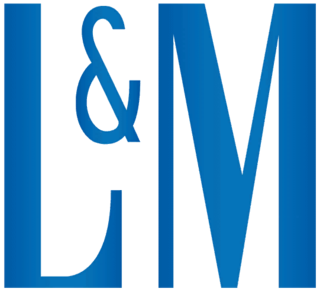
L&M is an American brand of cigarettes, currently owned and manufactured by Altria and Philip Morris International. The name comes from the tobacco company founded in 1873 called Liggett & Myers, predecessor of today's Liggett Group, in which L&M was originally produced.
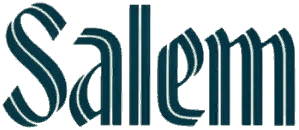
Salem is an American brand of cigarettes, currently owned and manufactured by ITG Brands, a subsidiary of Imperial Tobacco, inside the U.S. and by Japan Tobacco outside the United States.
Dipping tobacco is a type of finely ground or shredded, moistened smokeless tobacco product. It is commonly and idiomatically known as "dip". Dipping tobacco is used by placing a pinch, or "dip", of tobacco between the lip and the gum. The act of using it is called dipping. Dip is colloquially called "chaw", "snuff", "rub", or "fresh leaf" among other terms; because of this, it is sometimes confused with other tobacco products—namely nasal/dry snuff.
Viceroy is an American brand of cigarettes, currently owned and manufactured by R. J. Reynolds Tobacco Company in the United States and British American Tobacco outside of the United States.

Du Maurier is a Canadian brand of cigarette, produced by Imperial Tobacco Canada, a subsidiary of conglomerate British American Tobacco. The brand is named after Sir Gerald du Maurier, the noted British actor. The brand is also produced under license by the West Indian Tobacco Company in Trinidad and Tobago.
Winston is an American brand of cigarettes, currently owned and manufactured by ITG Brands, subsidiary of Imperial Tobacco in the United States and by Japan Tobacco outside the U.S. The brand is named after the town where R. J. Reynolds started his business which is Winston-Salem, North Carolina. As of 2017, Winston has the seventh-highest U.S. market share of all cigarette brands, according to the Centers for Disease Control and Prevention and the Maxwell Report.

Fatima Cigarettes was an American brand of cigarettes, owned and manufactured by the Liggett & Myers tobacco company.
Barclay was an American brand of cigarettes manufactured by R. J. Reynolds Tobacco Company in the U.S. and by British American Tobacco outside of the U.S.
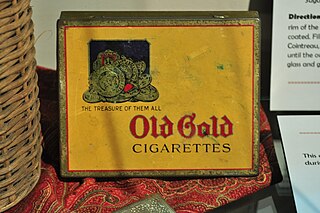
Old Gold is an American brand of cigarette owned and manufactured by the R. J. Reynolds Tobacco Company.
Tobacco usage in sport is a well documented and publicised occurrence. Tobacco advertising has connected itself to sports both for the connotations of health that sports provide, as well as the marketing potential of famous athletes. Additionally, tobacco has played a role in the sport of baseball specifically and has affected both the rules affecting players and fan alike. Agencies such as the CDC have used sports as platforms for tobacco prevention programs, specifically targeted at younger people.

Bull Durham Smoking Tobacco, also known as "Genuine Bull Durham Smoking Tobacco", was a brand of loose-leaf tobacco manufactured by W. T. Blackwell and Company in Durham, North Carolina, that originated around the 1850s and remained in production until August 15, 1988. Over the years, the brand often changed ownership yet continued to be one of the most successful tobacco brands. The brand is most commonly associated with its advertising campaigns. William Thomas Blackwell, an original investor and owner of the Blackwell Company, contributed greatly to the success of the product. Blackwell and his company's tactics with the brand paved the way for other corporations to succeed through the acquisition of the Bull Durham trademark. The success of the product ultimately is due to the successful advertising campaigns that made Durham world famous, brought jobs to the city, and made Durham the tobacco capital of the United States.
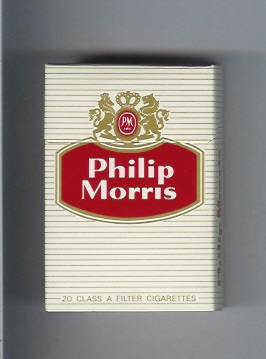
Philip Morris is an American brand of cigarettes, currently owned by Philip Morris International. Cigarettes are manufactured by the firm worldwide except in the US, where Philip Morris USA produces tobacco products.


